Seinäjoki and Kokkola University Consortiums turn 20 this year - University of Vaasa's activities in the regions strengthen knowledge and research cooperation
At the beginning of 2004, six university consortiums were established in Finland, including the Seinäjoki University Consortium and the Chydenius University Consortium in Kokkola, to coordinate university activities in regions that did not have their own university.
The University of Vaasa has four Epanet professorships in Seinäjoki, leading research in entrepreneurship, consumer behaviour, logistics and the business of wood construction. In Kokkola, research and development in business economics has been carried out under the leadership of a professor from the University of Vaasa.
In Seinäjoki, the University of Vaasa organises a Master's programme in Management of Growing Companies and a Master's programme in Strategic Project Management in English, as well as open university studies.
In Kokkola, the University of Vaasa organises a Master's programme in Business Development, which has become a popular programme among applicants.
– University consortiums have been ahead of their time in developing flexible study pathways and as joint platforms for research and RDI closely linked to industry. The universities' activities in the university consortiums support educational equality and competence development throughout Finland, says Tanja Risikko, Vice Rector of the University of Vaasa.
The Seinäjoki University Consortium also includes the Universities of Tampere, Helsinki and the University of Arts. The University Consortium Chydenius in Kokkola includes the University of Vaasa, Jyväskylä and Oulu.
